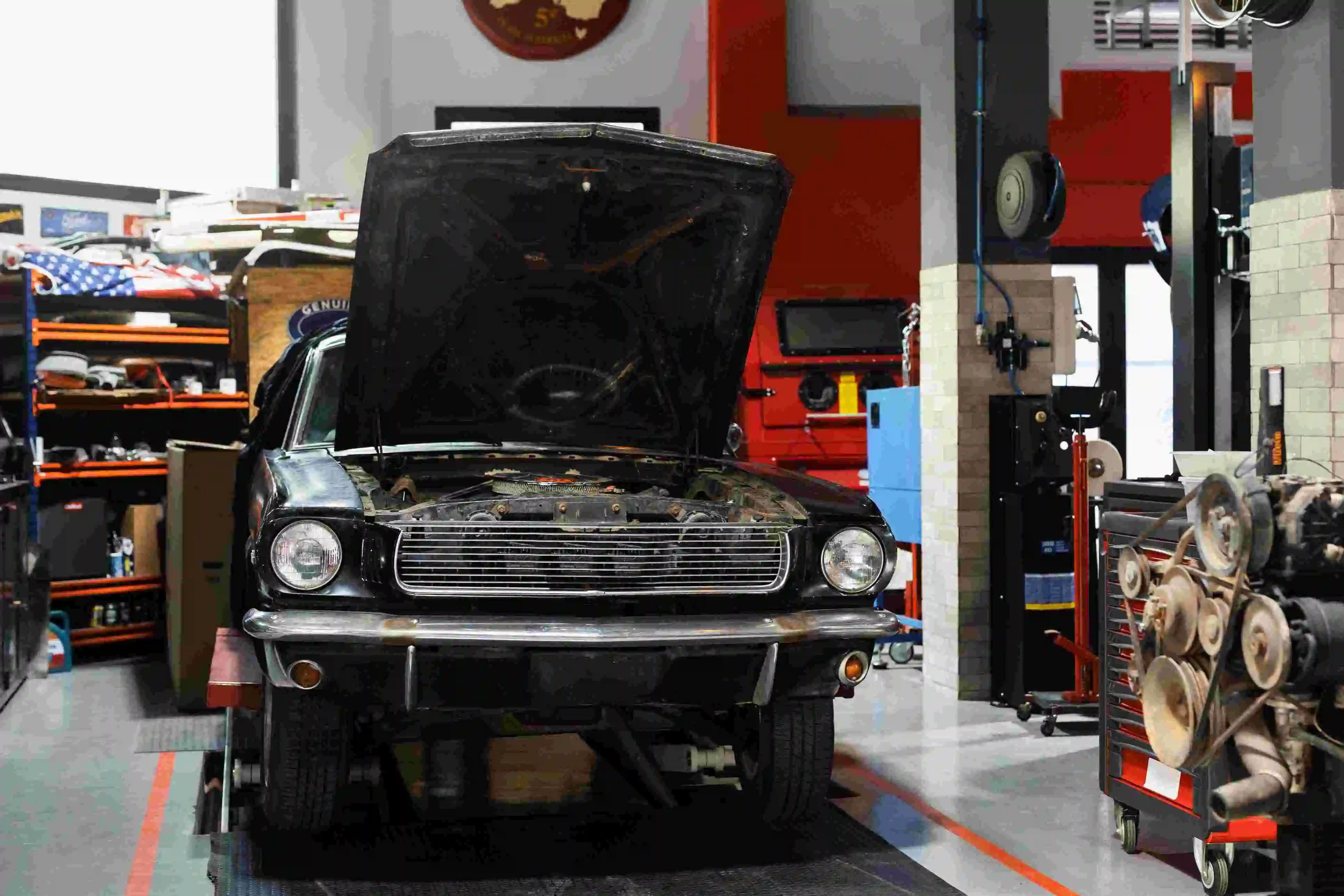Many people think car modifications are only for aesthetic purposes, but this process can also help improve comfort. As long as modifications are done with the right principles in mind, from the components used to the fundamental steps of doing it correctly, it can be effective.
If you're considering car modifications, make sure to know the essential tips so the final results won't be disappointing. This article will cover everything about car modification, from idea recommendations to tips for making safe changes. Check out the full review below.
1. Car Modification Ideas
When modifying a car, you may have a lot of ideas to achieve impressive results. Here are various modification ideas for different parts of the car to enhance appearance, performance, or comfort.
1.1 Car Seat Modification
Modifying car seats is a way to enhance the comfort, aesthetics, and personality of your vehicle's interior. You can consider several options for modifying this part, from materials, designs, to added comfort features. For materials, one option is Alcantara, a synthetic suede often used in sports or luxury cars. Its advantage is a good grip, preventing the driver and passengers from slipping.
You can customize the seat design to match your style, such as using special stitching patterns (diamond stitch, quilted, etc.), or adding a logo or initials to the headrest. Additionally, you can add extra padding to the back or thigh areas for better comfort, especially on long journeys.
1.2 Choose the Right Window Tint
Choosing the right window tint depends on several factors, such as privacy needs, comfort, safety, and style. Window tints are made from various materials, such as polyester, designed to block heat, reduce glare, provide privacy, and protect against harmful ultraviolet (UV) rays.
For daily protection, a 20-40 percent darkness level should be enough to provide sufficient sun and UV protection, as well as adequate privacy without overly limiting visibility. Aesthetically, there are several color options available, including neutral shades that give a clean look and suit various types of vehicles.
1.3 Upgrade Audio System Quality
Upgrading your car's audio system can improve your music listening experience while driving. For example, replacing the standard head unit with a more advanced aftermarket model can provide better sound quality and more features. Choose a head unit with Apple CarPlay or Android Auto support for better phone integration.
Here are some tips for car audio modification: If you want clearer music, consider adding sound-deadening material, which can reduce road noise and vibrations. It also helps keep the bass from the subwoofer focused and prevents it from spreading.
1.4 Choose the Right Tires
If you're aiming to improve performance and handling, especially for sports or high-performance cars, performance tires or high-performance tires are the right choice. These tires are designed to provide maximum grip on both dry and wet roads, and enhance steering responsiveness.
On the other hand, touring or grand touring tires are suitable for daily vehicles modified for comfort, fuel efficiency, and long-distance travel. These tires feature smooth tread designs, offering a balance between comfort, longevity, and decent performance.
1.5 Car Wheel Modification
Car wheel modification is one of the most popular ways to enhance the appearance, performance, and even handling of a vehicle. Alloy wheels are the most common for modifications because they are lighter than steel wheels and offer a more elegant look. They improve performance by reducing the vehicle’s overall weight (unsprung weight), thus improving handling and fuel efficiency.
The width of the wheel also affects performance and appearance. Wider wheels allow for wider tires, which improves traction and stability. However, ensure the wheel width matches the tire and fender specifications to avoid rubbing or clearance issues.
1.6 Update Lights According to Regulations
When updating car lights during modifications, it is essential to follow the applicable regulations to ensure the vehicle's safety and legality. Understand the types of lights to be updated, including headlights, signal lights, and fog lights.
Don’t forget to adhere to local vehicle lighting regulations. Ensure the installed lights meet the technical specifications set by the local transportation authorities. For example, in some countries, headlights must have the proper light intensity and beam angle.
1.7 Add Car Accessories
Adding accessories to your car is a great way to improve its appearance, comfort, and functionality. For example, body kits that include front, side, and rear bumpers, side skirts, and diffusers give your car a sportier and more aggressive look.
Additionally, you can enhance the car’s interior, such as seats, steering wheels, pedal kits, carpets, and dashboard panels. You can also improve security by installing an alarm system to protect your car from theft. Consider adding extra sensors and safety cameras to enhance protection and help you avoid accidents.
Also Read: How to Get Rid of Light and Deep Car Scratches
1.8 Upgrade the Suspension
If you plan to upgrade the suspension, one of the key considerations is the vehicle's height. Choosing the right height can affect both appearance and performance. Lowering the car can give it a sporty look and improve handling, but it may sacrifice comfort and ground clearance.
Also, consider the type of suspension system, such as coilovers, air suspension, or shock absorbers.
1.9 Install a Roof Rack
Installing a roof rack on your car is a popular modification to increase storage capacity and functionality, especially if you frequently travel or need extra space for cargo. But before doing so, make sure to choose the right type of roof rack. For instance, roof bars are one of the simplest types, ideal for carrying bike racks, roof boxes, or ski racks.
Ensure the roof rack you choose matches the vehicle's maximum roof weight capacity. This information is usually found in the vehicle manual or roof rack specifications.
2. Car Parts You Shouldn’t Modify
When considering car modifications, it's important to know which parts should not be altered. Modifications to these parts can pose safety risks or violate legal regulations. Here are some car parts that should not be modified, along with explanations.
2.1 Horn
Modifying the car horn can affect key aspects of safety and compliance, so it's recommended not to do it. The horn is designed to produce a sound loud enough to alert other drivers of your presence, especially in emergency situations. Non-standard horns may not be as effective in situations requiring quick attention.
2.2 Non-Standard Wheels and Tires
Wheels and car tires that do not meet the manufacturer's specifications can affect the vehicle's balance and stability while driving. Tires that are too large or small, or wheels that don't fit properly, can cause problems such as uneven wear or handling issues.
Although wheel and tire modifications can enhance the vehicle’s appearance, make sure that aesthetics don't compromise safety and performance.
2.3 Bumper
Bumper modifications are often popular for improving the aesthetics or functionality of a vehicle. However, there are reasons to be cautious or even avoid modifying bumpers.
Modified bumpers can affect the vehicle's structural balance and impact integrity. This may reduce the vehicle's ability to protect passengers and cause more severe damage to the vehicle. Bumper modifications, especially those adding weight or altering the vehicle’s weight distribution, can affect handling and braking.
2.4 Ground Clearance
Changing ground clearance can affect vehicle stability, especially when turning or maneuvering. Increasing ground clearance raises the vehicle's center of gravity, which can make it more prone to rolling over or losing control.
Increased ground clearance can also increase air resistance, which in turn can reduce fuel efficiency. Higher air resistance can negatively impact the vehicle’s overall fuel performance.
2.5 Steering Wheel
The steering wheel is designed to provide precise and responsive control over the vehicle's steering system. Modifying the steering wheel, such as changing it to a different model or altering its size, can affect your ability to control the vehicle accurately, especially in emergency situations.
3. Safe Car Modification Tips
Safe car modification requires special attention to safety, regulations, and quality. Here are some tips for safe car modifications. Check them out below.
3.1 Choose a Concept or Theme for Your Modifications
Selecting a concept or theme for car modifications is a crucial step in the modification process, as it sets the style and direction of the modifications. Some concepts to consider include racing, retro, off-road, urban street, and luxury.
It is important to ensure that modifications do not reduce the comfort and functionality of the vehicle in daily use. For example, for a luxurious look, choose high-quality materials and incorporate advanced features.
3.2 Prepare the Components to Be Modified
Properly preparing the components for modification is essential to ensure satisfactory and functional results. Choose components that match your modification goals. For example, if you want to improve performance, focus on the suspension, braking, and engine systems.
Do your research on the various brands and types of components available. Read reviews, ask automotive communities, and compare specifications. Choose components from reputable brands known for quality and durability. Avoid cheap components that may lack quality or durability.
3.3 Estimate the Modification Costs
Estimating car modification costs is an important step to ensure the project stays within budget and avoids unexpected expenses. Create a detailed list of all the modifications you want to make, including components, accessories, and services required.
Decide whether the modifications will be done all at once or in phases. Prioritize modifications based on your needs and budget. Then, research the prices of the components you’ll be using through e-commerce sites, automotive forums, and manufacturer websites.
3.4 Consult an Expert If You're a Beginner
If you're new to car modifications, consulting an expert is a good move to avoid potential mistakes. An expert can provide the right advice and help choose appropriate components and accessories for your car.
They can also guide you on proper installation and avoid mistakes that may affect performance or cause damage to the vehicle. If you’re planning complex modifications, such as altering the suspension, engine, or electronic systems, professional help is essential for safety and compliance with regulations.
3.5 Use Certified and Reputable Accessories
Using certified and reputable accessories is crucial to ensure that the components you install are safe, durable, and meet quality standards. Look for certifications such as ISO or SNI for Indonesian products. These certifications indicate that the components have passed safety and quality tests.
Beware of counterfeit products, as they may lack the necessary quality and safety standards. Although these products may be cheaper, they can pose risks to vehicle performance and safety.
Also Read: Latest Car Service Fees and Car Service Saving Tips
3.6 Check the Impact of Modifications on Insurance
Some car modifications can affect the terms of your insurance policy. For example, modifications that alter the vehicle’s performance or appearance may increase the risk of accidents or theft, which could result in higher premiums.
Make sure to inform your insurance provider about any modifications made to the vehicle. They will review the modifications and decide whether to adjust the coverage or premiums.
In conclusion, car modifications are a fun and rewarding way to personalize your vehicle according to your preferences and needs. However, safety and comfort should remain the primary considerations during the modification process.
By following these safe car modification tips, you can achieve satisfying and functional results while minimizing the risk of potential problems or accidents. Don't hesitate to consult experts or professional mechanics if you're unsure about modifications or need advice on the best components to use.
BFI Finance is a multi-purpose company that provides loans with collateral such as motorcycle registration certificates, car registration certificates, and house certificates. Enjoy disbursement of up to 95% of the asset value for motorcycle and car registration certificates with competitive interest rates at BFI Finance. Don't worry, as BFI Finance is officially registered and supervised by the Financial Services Authority (OJK). Whatever the issue, #There'sAlwaysAWay with BFI Finance.






